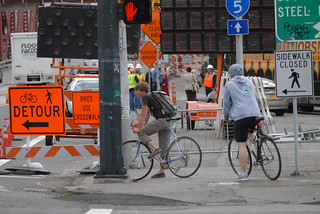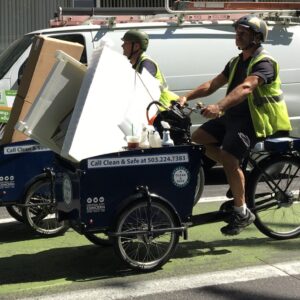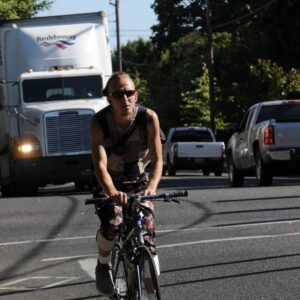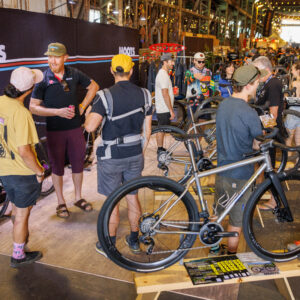For three full days next week, the paths on each side of the Broadway Bridge will be closed so the Bureau of Transportation (PBOT) can do maintenance on the non-slip surface that covers the lift-span. The closure means that the thousands of people who ride and walk on the paths each day will be re-routed about one-half mile south to the Steel Bridge.
Closing both sides of the bridge paths is a new move for PBOT and one that has already rankled some feathers. When this same maintenance project was performed last fall, the City’s detour plans kept one side of the bridge open to bicycling and walking traffic at all times. Then, when the detour was clearly too confusing and not as safe as it could be, some smart advocacy and a bit of public pressure convinced them to dedicate a lane on the bridge roadway for bicycling.
“We think we found the least unpleasant option among many bad options.”
— Dylan Rivera, City of Portland Bureau of Transportation
Why did PBOT choose a full closure this time around without creating the dedicated bike lane on the bridge roadway like last fall? City spokesman Dylan Rivera says it wasn’t an easy decision. “Staff across several PBOT divisions and the Portland Streetcar agonized over how to handle this closure to minimize the disruption to all bridge users,” he shared with us via email yesterday, “We think we found the least unpleasant option among many bad options.”
Rivera said they considered keeping one eastbound traffic lane open for bicycling, but that last year it “created massive gridlock that stranded buses, streetcars, trucks and cars for more than 90 minutes in many cases.” He also said PBOT heard accounts from witnesses who saw people in cars turning around on the sidewalks and going the wrong way on one-way streets to avoid the backups. “It was a mess.”

For context, the City’s latest traffic counts show about 4,432 daily trips by bicycle over the Broadway Bridge compared to 25,359 daily auto trips.
The City also considered closing one path at a time, but Rivera said that would have meant a longer overall closure period and he pointed to complaints from bridge users last year about that plan’s confusing and unsafe detours. “We’re trying to learn from our past experience.”
Seemingly unhappy with the detour plans, the Bicycle Transportation Alliance (BTA) published a blog post today urging people to “take the lane” on the Broadway Bridge during the closure:
We would like to clarify that it is legal to bike on the deck of the bridge. People crossing the bridge on bikes should feel confident taking the lane. Extra care should be taken around the streetcar tracks particularly on the west end for those travelling westbound… Those who are not comfortable biking across the deck of the Broadway Bridge should use PBOT’s recommended alternative: the Steel Bridge.
The BTA also added they hope PBOT plans for people on bikes to be on the bridge roadway by installing “Bicycles On Roadway” caution signs and perhaps a temporary speed limit reduction zone.
Asked for his thoughts on the BTA’s “Take the lane” recommendation, Rivera at PBOT said the City remains “neutral” on the issue. “Cyclists need to decide for themselves if they are comfortable doing so because of the traffic volumes and speed. For those who choose to take the lane, we would urge caution around the streetcar tracks on the west side of the bridge.”
Specifically, Rivera says westbound riders who take the lane will have to cross streetcar tracks at a much more shallow angle than the path creates and will be at greater risk of “slipping a wheel in the tracks.”
As for signage, the City is still evaluating their plans for this closure, but Rivera told us they are paying, “paying special attention to signage for all road users.”
—
One important issue at play here is how the increase in bicycle use has outpaced the City’s expertise in developing traffic mitigation plans during construction projects. It will be interesting to see how this issue evolves over time. For now, use caution around work sites and let us know what you see out there. You can also contact the City at safe@portlandoregon.gov or at 823-SAFE if you come across unsafe bicycling conditions.
UPDATE, 7:54: At the Multnomah County Bicycle and Pedestrian Advisory Committee tonight, there was a discussion that a potential solution for walking traffic would be to have Portland Streetcar offer free rides on those days. We’ll update you if anything comes of that idea.








Thanks for reading.
BikePortland has served this community with independent community journalism since 2005. We rely on subscriptions from readers like you to survive. Your financial support is vital in keeping this valuable resource alive and well.
Please subscribe today to strengthen and expand our work.
Taking the lane. Taking the lane. Taking the lane.
Exactly! Bike traffic usually goes faster than vehicle traffic during rush hour on the Broadway Bridge anyhow!
Taking the Lane with you brother. One lane bicycles the other lane cars. Fair enough! And guess what. Cars can also take the Steel Bridge if they don’t want to slow down to one lane.
Jonathan, is any of this work related to the bicycle lane on the west end being spray painted black? Specifcially, I noticed this morning while waiting for the dedicated bike light that the dotted “continuation” lines from the MUP to the bike lane were painted over with black. Additionally, the bike light failed to fire after a waiting a full cycle.
And this morning, someone repainted them white (looks like spray paint again).
I just do not believe them when they say traffic was backed up for 90 minutes. At all. I’ll be taking the lane (when I don’t have my dog). Glad to hear the BTA is encouraging that!
How many times is this that they’ve closed the paths to recoat the anti-slip? Seems to me that they picked the wrong materials to make that sidewalk on the lift section – instead of something that requires coating, they should have used something that has the texture built/mixed in the material.
Ugh, that sounds like an unpleasant (if taking the lane) or annoying (if detouring to Steel Bridge) couple of days for bike/ped travelers in that area.
No kidding that the City needs to better accomodate bike/ped traffic during construction and special events.
The City’s current detour of two-way bike and pedestrian traffic onto SE Clinton’s narrow sidewalk between SE 26th and 29th (people with bikes being directed to walk) is not so great either. I’m really not looking forward to when all traffic from SE Division is directed onto Clinton for three weeks in August. City of Portland, you’ve gotten many of us to rely on biking as a useful, reliable form of transportation. Don’t forget about us when construction / summer festival season starts!
I hear you! Drivers that are obviously annoyed are Speeding down Clinton and then going back to Division. It’s horrible. For a bonus it threw off the garbage collection this week. I was not pleased to find the “walk your bike” signs today. Guess I’ll be shopping at the Hawthorne New Seasons during this part so I can walk the full bakfiets downhill instead of up. 🙁
You all know Woodward goes all the through to 45th from 15th. Turn south on Brooklyn at 43rd or so and take it t0 52nd…. now you can past 82nd and never look at Clinton.
Sorry at 52nd head back to Woodward…..
That is true! So where is my City-provided signage reminding me to move over to Woodward?
A more city worker labor intensive way would be to have temporary full lane closures on the main bridge deck. I’ll explain:
When a back country 2 lane road needs maintenance crews will shutdown the entire lane for a length and have a pilot car escort a group of one way traffic alternate to the opposite direction as demand requires.
They could have a flagger at either end of the bridge and when say 5 or more cyclists are queued up and the traffic signal phase safely allows the flagger would stop traffic in the outside lane allowing a lane dominating clump of cyclists to traverse the Broadway Bridge.
This would not invalidate the right of “strong & fearless” cyclists to just take the lane but would provide the safety in numbers and an official state sanction on cyclists taking the full lane, if only temporarily.
Why can’t they work on weekends like ODOT does to avoid commute hassles?
or at night.
The true sign of a bike-friendly city is how they deal with detours.
In this proposed scenario, we definitely fail at providing a realistic alternate route that works well for people biking and more importantly (due to the long distance) people walking.
How dare we inconvenience people driving in their cars while sitting on a comfortable couch in air conditioning on a gorgeous summer day! It’s not as if we have a hierarchy already set-up to inform our decisions and have some sort of priority in place: http://www.portlandoregon.gov/bps/article/441509 (see page 5 for the BIG TRIANGLE)
totally agree!
if they have to close the road to a mode it should be the least vulnerable mode, motor-vehicles… they can more easily and comfortably drive the extra distance out of their way…
this is why we can’t have nice things…
So if we’re counting, that’s a whole lot of crap detours occurring or upcoming:
– SW Macadam sidewalk replaces Westside Trail
– Steel Bridge replaces Broadway
– SE Clinton (sewer work)
– Trimet PMLR closure of all inner eastside rail crossings (I just got the detour map in my Inbox, and it’s very unhelpful as it doesn’t provide actual alternatives for bikes, only shows possible alternate routes — and only two and widely separated ones at that.)
Come on, City of Portland, get the hint! Entities operating within the city need to provide detour plans that are safe, sane, and as short as possible for all modes, prioritizing those without a steel shell and separate power source.
And the bike/ped detours need to be wide enough for 2 cargo bikes going in opposite directions to pass each other. I got to navigate the Clinton/11th & 12th detour the other day and was glad it was the weekend so there was no one else trying to use it with me. Not all bikes are skinny little things that can get up to fast speeds quickly.
Yes, I am in total agreement, work zone management for vulnerable road users is STILL the big FAIL in this and most other bike friendly communities sadly. I understand the streetcar cannot move…but given the location of this bridge crossing I would have expected PBoT had felt it was more important to keep human powered connectively since a car detour to the Steel Bridge (or Fremont Bridge) is much more easy and safer than for peds or bikes.
I wish the LAB were to include work zone issues in their ranking of top tier cities like Portland/ Chicago/ NYC etc…as none of them match the level of connectively, safety that my ancient 1996 NL CROW manual does in its planning and work zone management chapters. This is basic stuff that is important for traffic safety but often swept under the rug by [multimodally] inexperienced counter staff or a blind eye is turned in its direction by project managers just trying to get it done.
Part of my strong reaction to this news, is that I was very impressed with the decision to implement the Broadway Bridge work zone last year. I had high expectations it would be implemented again and in an even better form based on the initial lessons learned. That this was the City that actually could get to the 25% bike mode split. …But no.
“That this was the City that actually could get to the 25% bike mode split. …But no.”
If you do the math, on the bridge in question, the mode split is already approaching 15%. What is 15% of the bridge’s lane width? How much of a mode split do we need to be treated as full participants, as deserving a real solution during construction? Whose inconvenience counts?
Yep, taking the lane. And I hope I have lots of two-wheeled company. Can you imagine if they did they same thing to auto traffic? Broadway is closed, go take the Steel? There would be rioting in the streets.
In fairness, they did close the Morrison for a few months last year (or was that early this year?), and it did result in royally screwed up car traffic.
Perhaps the Streetcar people will offer free crossings of the work zone for vulnerable road users. (This would also boost their ridership data and build back some bike support.;-)
I seriously think this is the achilles heel of Portland’s bicycle friendly status. We are very far behind other municipalities when it comes to accommodating bicycles during construction — meaning everything from major infrastructure projects to basic maintenance to permitting for private property construction.
Example #1: I was riding on a popular SE Neighborhood Greenway the other day when I came across “road closed” signs. I hopped up on the sidewalk to cruised by the maintenance bureau hovering over a project that occupied less than 30% of the roadway width. I can see how allowing cars through could slow them down or even put workers in danger. But there was more than enough room to cone off a simple pass-thru for bicycles… on a bikeway.
Example #2: I would hate to live in the Brooklyn neighborhood for the next few weeks. They are going to be on a desert island thanks to the Portland-Milwaukie Light Rail simultaneous closures of 8th, 9th, 11th, 12th, and 17th crossings of the freight rail tracks. Ouch!)
Example #3: Any major construction project in the central city. All over town, the Bureau of Development Services is issuing permits for construction vehicles, fencing, etc to close down major bikeways and bike lanes in this city. Worse yet, BDS and PBOT are doing little or nothing in the way of enforcing what permits are issued. A new apartment building going in on SW 5th Ave near PSU was blocking the bike lane without a permit (or any warning signage) for nearly 3 months this year. After a great deal of pestering, the city finally sent someone out to “evaluate”. The problem was corrected for a few weeks but has recently slid right back to the same miasma.
The list goes on and on, and nearly everyone who rides a bike in this city has their own story. These aren’t just inconveniences. Often times, riders find themselves thrown into very challenging, even dangerous interactions with other modes as a result of Portland’s poor performance in this important aspect of transportation management.
It’s time we put our mitigation where our mouth is.
“…These aren’t just inconveniences. Often times, riders find themselves thrown into very challenging, even dangerous interactions with other modes as a result of Portland’s poor performance in this important aspect of transportation management.”
I couldn’t agree more. To add to the list, the (assumed) sewer work on N Williams (just north of Russell) that is currently going on has resulted in an extremely bumpy bike lane – with the bike lane marking completely removed. This isn’t just an inconvenience, I was biking on this stretch trying to stay in the (invisible) bike lane, but it was jostling me and my trailer around so much that I had to depart from this portion of the road and enter the travel lane where many people were approaching me and driving fast – just like normal. I hate having to enter the lane on this road, but in this case it was the better option than staying in the extremely bumpy bike lane that could have easily caused an injury due to my many wheels getting thrown off balance all over the place in an unpredictable fashion.
I find in construction projects around town, auto traffic is always accommodated but bike traffic often is not. For example, on SW First near Lincoln, the street has 2 southbound auto lanes and a bike lane. The MAX construction crews typically close the bike lane and the rightmost auto lane. They could easily leave an additional 5′ of space for a temporary bike lane but somehow they never think of that.
did we not just restripe the uphill broadway approach to this bridge so that now there is only one lane feeding the bridge from broadway and one from lovejoy? on different signals. and at the other end it opens out to two plus a right turn lane. how is it possible that closing one lane would cause any backup at all, let alone ninety minutes?
There are two lanes coming up from Lovejoy however.
This is a great example of how the city handles bike lanes and road work on Broadway…
View Larger Map
I don’t think the Portland cycling community is ever happy about anything.
I don’t think the <insert city or town name> <insert group name used to generically refer to people that do something> community is ever happy about anything.
There, I fixed it for you.
frankly, cyclists should not be relegated to an MUP over the broadway bridge in the first place. the right lane should be sharrowed, period.
‘course, we would still be detouring pedestrians during this fix.
I hope they go with the reduced speed limit and add extra enforcement if they expect to see people driving up on the side walks again.
If they’d agonized just a bit longer they might have come up with the idea to put permanent sharrows in the outside lanes. Just like the St. Johns Bridge.
The streetcar tracks going westbound are not good, but I’ve never found them to be troublesome the times I’ve taken the lane westbound.
Ted Buehler
Yeah, that would work for a constrained period like construction. But I’d still rather ride on the Broadway Bridge sidewalks, or MUPS or whatever they’re called, than a sharrowed lane, only because the sidewalks on the Broadway bridge are at least a little more comfortable than the St. John’s Bridge sidewalks. Of course, with the amount of bicycle traffic on the Broadway bridge, something like sharrows during peak times could be rather effective.
At least if you take the bridge deck during this period there will likely be other bicyclists on the roadway, instead of being the lone wolf in a sea of speeding traffic and semi-trucks on the St. John’s bridge.
I hope I get to use this during this construction period-not sure if I will- just for the simple comparison.
IMO, PBOT intentionally destroyed the utility of sharrows in PDX by using them for wayfinding on our fine motorist cut-through bike boulevards.
Water taxi? There has to be an option for a boat crossing. Could be an interesting way to show the viability of water commuting. Seems like a missed opportunity.
Not perfect but maintenance has to happen.
I like some of the alternate suggestions in the story above, such as reduced speed to help accomodate those that choose to bike over the deck along with the cars. That said, 1/2mile detour on a bike equates to about 4min for most casual riders, which seems reasonable in most instances.
There’s rarely a solution that will satisfy everyone and, frankly, PBOT’s declaration that they’re trying to learn from past experience resonates with me. I drive too, and I’ve come across road closures in my car over the years. My own experience indicates to me that PBOT’s plan of action is nothing close to a personal attack on my bicycling activities.
I’ll be taking the deck, with full respect for the PBOT closure and the 2000+lb vehicles I’ll be sharing the road with. Not in protest, but for expedience. I’ll be pedalling ~35mph to keep up with traffic and I’ll catch my breath on the downslope.
…And after 3days, complete non-issue.
Peace.
I’ve got no problems with PBOT’s decision. It beats having to figure out a new traffic pattern and dealing with annoyed drivers AND cyclists because not everyone knows what’s going on or where to go.
Just go over the Steel Bridge for 3 days folks and enjoy the change in scenery.
You’re on a bike and you love to bike. How hard is it to add a mile to your bike commute for a few days?
What a missed opportunity by our city’s “transportation” officials. All these summer road construction projects should/could be used to get more people out of their cars so they can discover first hand how easy, hassle free and fast traveling by bike can be. But no.
“How hard is it to add a mile to your bike commute for a few days?”
Riding a mile isn’t a problem.
Dealing with increased friction can be a problem. And time.
Dealing with 1 mile of highly congested roads is. It takes a lot of time. It takes a lot of concentration. If you’re coming from N/NE, the Broadway bridge is a straight downhill drop into town. And a fairly gentle, straight climb coming out.
Taking the Steel Bridge puts you on the lower deck (probably jammed with bikes and tourists during the Broadway closure), up/down the steep ramps with 4 sharp corners to the Rose Quarter, through a sketchy turn out of the Rose Quarter (southbound), in a lot of heavy uphill traffic, through a bunch of gnarly, poorly timed lights across Broadway/Weidler/Winning (southbound).
It takes a lot of the pleasure out of your ride if the Broadway Bridge gives you a nice, easy commute (except for congestion on the sidewalks) and the Steel Bridge puts you in congestion, with slower speeds, longer routes, sharper turns, longer delays at traffic lights (breathing crap for air the whole time) and mixing with lots of heavy traffic.
Admittedly the Broadway route isn’t always a bunch of roses, especially climbing up Weidler at rush hour, but ya gotta admit that folks detouring onto the Steel Bridge can legitimately claim that it’s “hard”.
Ted Buehler
I will try to take the lane, even though it freaks me out a bit on that bridge. I really hope they do have some good signage though.
Dear BTA,
I again offer my assistance in setting up an internal subcommittee to request and review targeted work zone plans and permits from area jurisdictions that affect the safety and mobility of bicyclists [and BTA members].
I’m actually more concerned there is no access for pedestrians to cross the Broadway Bridge during this closure. Not only does this provide a window in how PBOT prioritize modes, but also how the Bureau values (or devalues) delays for certain modes over others.
I’ll let folks be the judge…
Walking delay: http://goo.gl/maps/GOnw6
Biking delay: http://goo.gl/maps/ZGtyi
Driving delay: http://goo.gl/maps/4GILA
Traffic concerns aside, does the time of delay borne by certain modes over others indicate mode prioritization by the bureau? And to take it a step further, are there certain populations more adversely affected depending on the given mode delay?